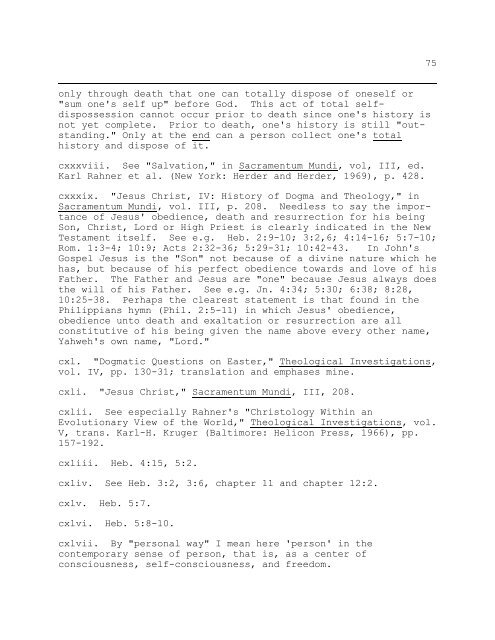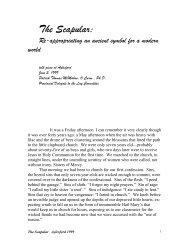Christocentrism of Charism – Buggert - CarmelStream
Christocentrism of Charism – Buggert - CarmelStream
Christocentrism of Charism – Buggert - CarmelStream
Create successful ePaper yourself
Turn your PDF publications into a flip-book with our unique Google optimized e-Paper software.
only through death that one can totally dispose <strong>of</strong> oneself or<br />
"sum one's self up" before God. This act <strong>of</strong> total selfdispossession<br />
cannot occur prior to death since one's history is<br />
not yet complete. Prior to death, one's history is still "outstanding."<br />
Only at the end can a person collect one's total<br />
history and dispose <strong>of</strong> it.<br />
cxxxviii. See "Salvation," in Sacramentum Mundi, vol, III, ed.<br />
Karl Rahner et al. (New York: Herder and Herder, 1969), p. 428.<br />
cxxxix. "Jesus Christ, IV: History <strong>of</strong> Dogma and Theology," in<br />
Sacramentum Mundi, vol. III, p. 208. Needless to say the importance<br />
<strong>of</strong> Jesus' obedience, death and resurrection for his being<br />
Son, Christ, Lord or High Priest is clearly indicated in the New<br />
Testament itself. See e.g. Heb. 2:9-10; 3:2,6; 4:14-16; 5:7-10;<br />
Rom. 1:3-4; 10:9; Acts 2:32-36; 5:29-31; 10:42-43. In John's<br />
Gospel Jesus is the "Son" not because <strong>of</strong> a divine nature which he<br />
has, but because <strong>of</strong> his perfect obedience towards and love <strong>of</strong> his<br />
Father. The Father and Jesus are "one" because Jesus always does<br />
the will <strong>of</strong> his Father. See e.g. Jn. 4:34; 5:30; 6:38; 8:28,<br />
10:25-38. Perhaps the clearest statement is that found in the<br />
Philippians hymn (Phil. 2:5-11) in which Jesus' obedience,<br />
obedience unto death and exaltation or resurrection are all<br />
constitutive <strong>of</strong> his being given the name above every other name,<br />
Yahweh's own name, "Lord."<br />
cxl. "Dogmatic Questions on Easter," Theological Investigations,<br />
vol. IV, pp. 130-31; translation and emphases mine.<br />
cxli. "Jesus Christ," Sacramentum Mundi, III, 208.<br />
cxlii. See especially Rahner's "Christology Within an<br />
Evolutionary View <strong>of</strong> the World," Theological Investigations, vol.<br />
V, trans. Karl-H. Kruger (Baltimore: Helicon Press, 1966), pp.<br />
157-192.<br />
cxliii. Heb. 4:15, 5:2.<br />
cxliv. See Heb. 3:2, 3:6, chapter 11 and chapter 12:2.<br />
cxlv. Heb. 5:7.<br />
cxlvi. Heb. 5:8-10.<br />
cxlvii. By "personal way" I mean here 'person' in the<br />
contemporary sense <strong>of</strong> person, that is, as a center <strong>of</strong><br />
consciousness, self-consciousness, and freedom.<br />
75



